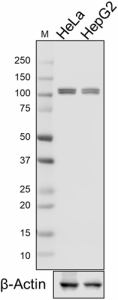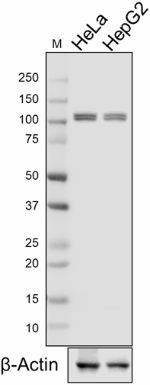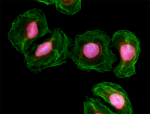- Clone
- 2G2.3.5 (See other available formats)
- Regulatory Status
- RUO
- Other Names
- Ubiquitin-Activating Enzyme E1, Ubiquitin-Like Modifier Activating Enzyme 1, UBE1, A1S9T, GXP1, SMAX2, 2G.2.3.5, 2G2.3-5
- Isotype
- Mouse IgG1, κ
- Ave. Rating
- Submit a Review
- Product Citations
- publications

-

Total cell lysates (15 µg total protein) from HeLa and HepG2 cells were resolved by 4-20% Tris-Glycine gel electrophoresis, transferred to a nitrocellulose membrane, and probed with 0.25 µg/mL Purified anti-E1 Ubiquitin Activating Enzyme Antibody, clone 2G2.3.5, overnight at 4°C. Proteins were visualized by chemiluminescence detection using HRP goat anti-mouse IgG Antibody (Cat. No. 405306) at a 1:3000 dilution. Direct-Blot™ HRP anti-β-Actin Antibody (Cat. No. 664804) was used as a loading control at a 1:50000 dilution (lower). Lane M: Molecular Weight marker. -

HeLa cells were fixed with 2% paraformaldehyde (PFA) for 10 minutes, permeabilized with 0.5% Triton X-100 for five minutes, and blocked with 5% FBS for 30 minutes. Cells were then intracellularly stained with 2 µg/ml of anti-E1 Ubiquitin Activating Enzyme antibody (clone 2G2.3.5 ) in blocking buffer overnight at 4°C and followed by DyLight™ 594 (red) conjugated goat anti-mouse IgG for one hour at room temperature. Actin filaments were labeled with Alexa Fluor® 488 Phalloidin (green). Nuclei were counterstained with DAPI (blue). The image was captured with a 60X objective.
| Cat # | Size | Price | Quantity Check Availability | Save | ||
|---|---|---|---|---|---|---|
| 932002 | 100 µg | 249€ | ||||
The proteasomal pathway of protein degradation involves two discrete steps: ubiquitination and degradation. Aside from proteasomal degradation, ubiquitination also plays an important role in transcriptional regulation, protein trafficking including endocytosis and lysosomal targeting, and the activation of kinases involved in signaling processes. Ubiquitination is carried out in three main steps: activation, conjugation, and ligation. E1 Ubiquitin Activating Enzyme (UBE1) initiates the cascade of conjugation by activating their respective modifiers. It is highly conserved in human, yeast, and plants. This gene complements an X-linked mouse temperature-sensitive defect in DNA synthesis, and thus may function in DNA repair.
Product DetailsProduct Details
- Verified Reactivity
- Human, Mouse
- Antibody Type
- Monoclonal
- Host Species
- Mouse
- Immunogen
- Mixture of human and mouse E1 protein.
- Formulation
- Phosphate-buffered solution, pH 7.2, containing 0.09% sodium azide.
- Preparation
- The antibody was purified by affinity chromatography.
- Concentration
- 0.5 mg/ml
- Storage & Handling
- The antibody solution should be stored undiluted between 2°C and 8°C.
- Application
-
WB - Quality tested
ICC - Verified - Recommended Usage
-
Each lot of this antibody is quality control tested by Western blotting. For Western blotting, the suggested use of this reagent is 0.25 - 2.0 µg per ml. For immunocytochemistry, the suggested use of this reagent is 1.0 - 5.0 µg per ml. It is recommended that the reagent be titrated for optimal performance for each application.
- Application References
-
- Salvat C, et al. 2000. Eur. J. Biochem. 267:3712.
- RRID
-
AB_2565603 (BioLegend Cat. No. 932002)
Antigen Details
- Structure
- 1058 amino acids with a predicted molecular weight of approximately 118 kD.
- Distribution
-
Ubiquitous, Eukaryotic cells.
- Function
- This protein catalyzes the first step in ubiquitin conjugation to mark cellular proteins for degradation.
- Interaction
- GAN.
- Biology Area
- Cell Biology, DNA Repair/Replication, Neurodegeneration, Neuroscience, Protein Trafficking and Clearance, Signal Transduction, Transcription Factors, Ubiquitin/Protein Degradation
- Molecular Family
- Protein Modifiers
- Antigen References
-
1. Xu W, et al. 2013. Curr. Pharm. Des. 18:3201.
2. Neutzner M, et al. 2012. Essays Biochem. 52:37.
3. Schulman BA, et al. 2009. Nat. Rev. Mol. Cell Biol. 10:319.
4. Salvat C, et al. 2000. Eur. J. Biochem. 267:3712. - Gene ID
- 7317 View all products for this Gene ID
- UniProt
- View information about E1 Ubiquitin Activating Enzyme on UniProt.org
Related Pages & Pathways
Pages
Related FAQs
Other Formats
View All E1 Ubiquitin Activating Enzyme Reagents Request Custom Conjugation| Description | Clone | Applications |
|---|---|---|
| Purified anti-E1 Ubiquitin Activating Enzyme | 2G2.3.5 | WB,ICC |
Compare Data Across All Formats
This data display is provided for general comparisons between formats.
Your actual data may vary due to variations in samples, target cells, instruments and their settings, staining conditions, and other factors.
If you need assistance with selecting the best format contact our expert technical support team.
-
Purified anti-E1 Ubiquitin Activating Enzyme

Total cell lysates (15 µg total protein) from HeLa and HepG2... 
HeLa cells were fixed with 2% paraformaldehyde (PFA) for 10 ...

 Login / Register
Login / Register 







Follow Us